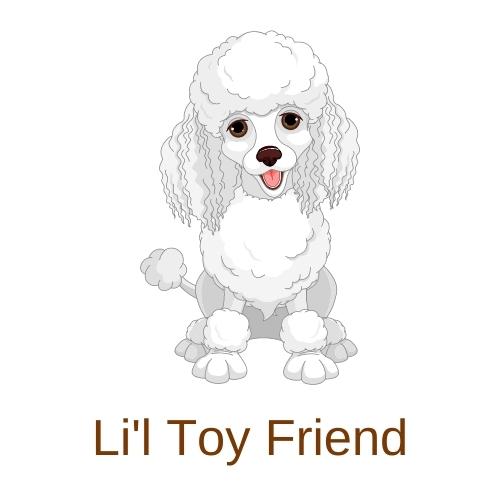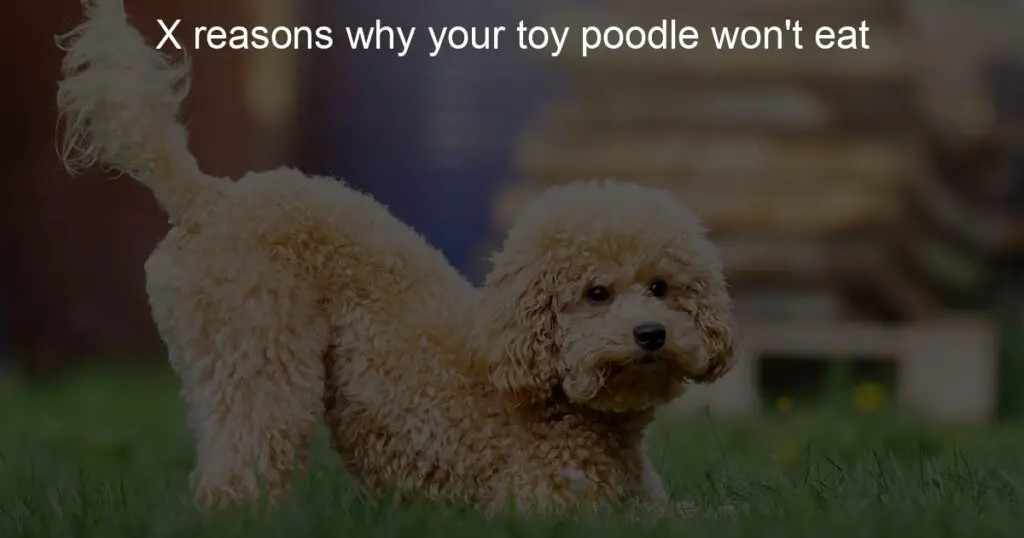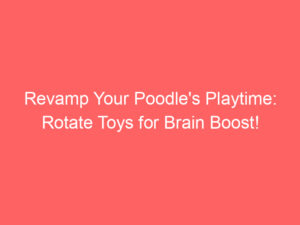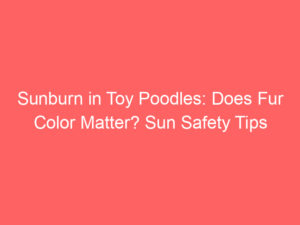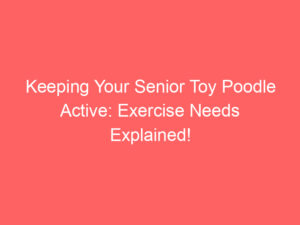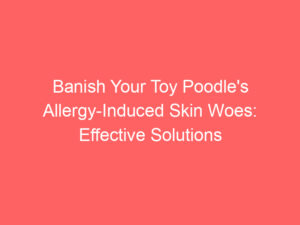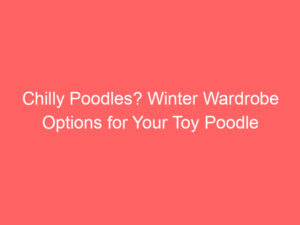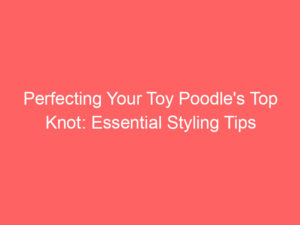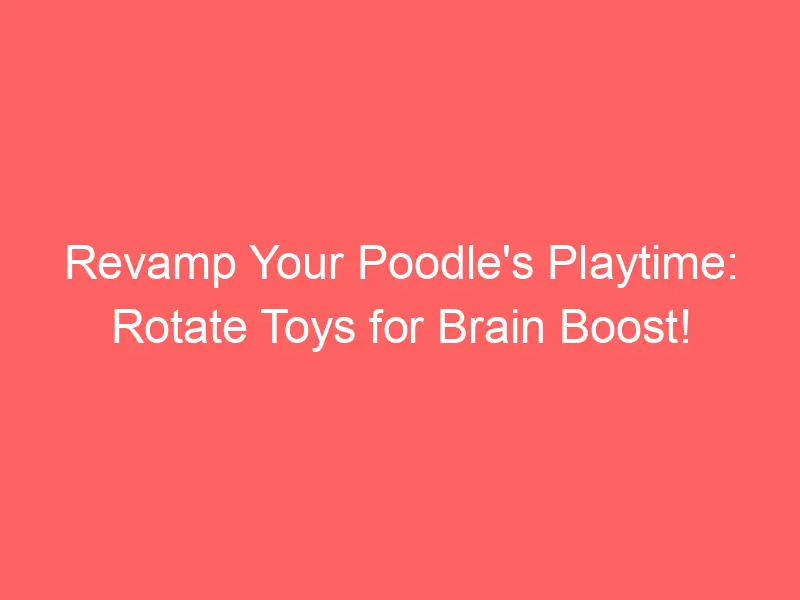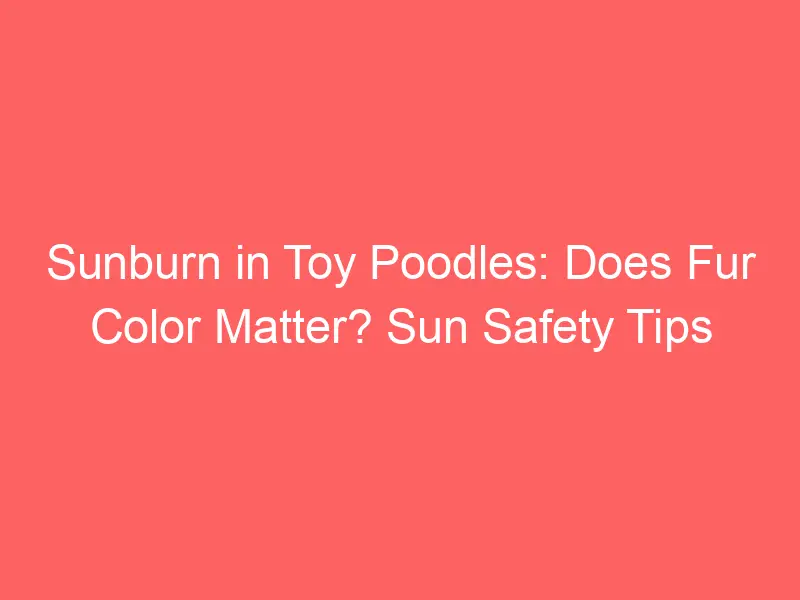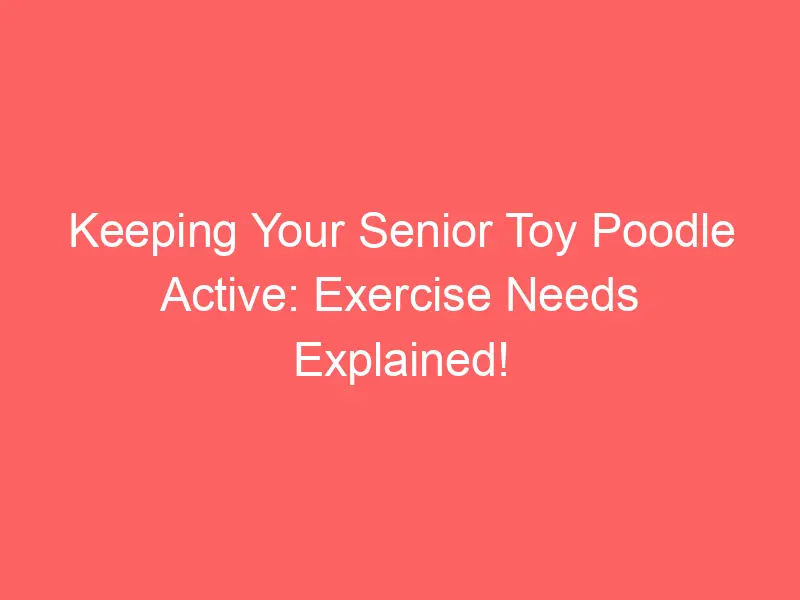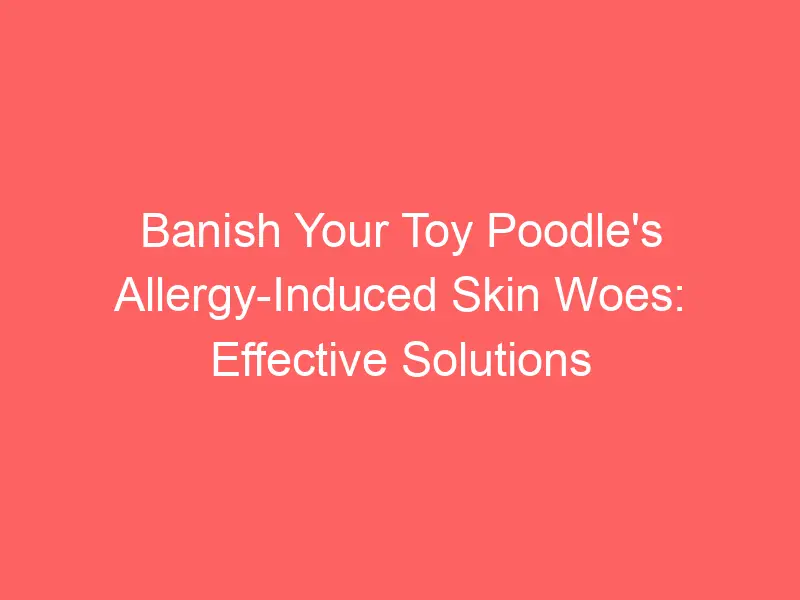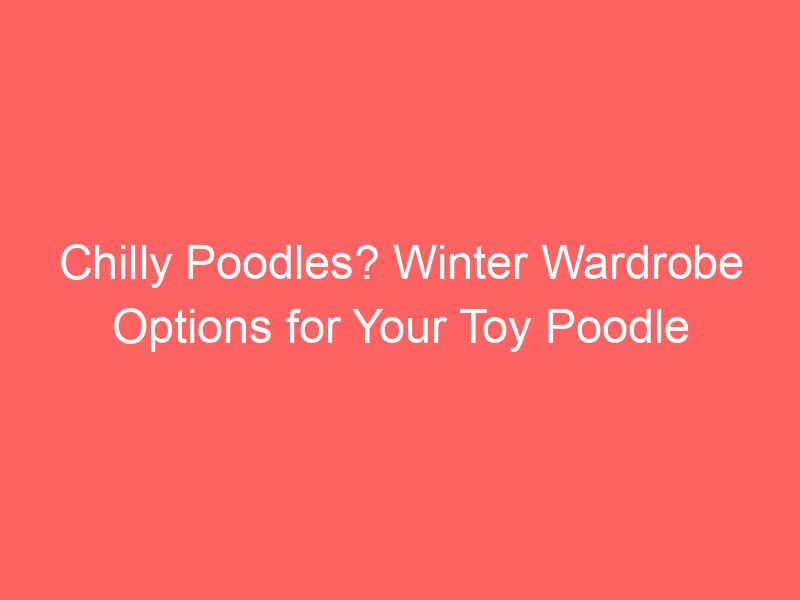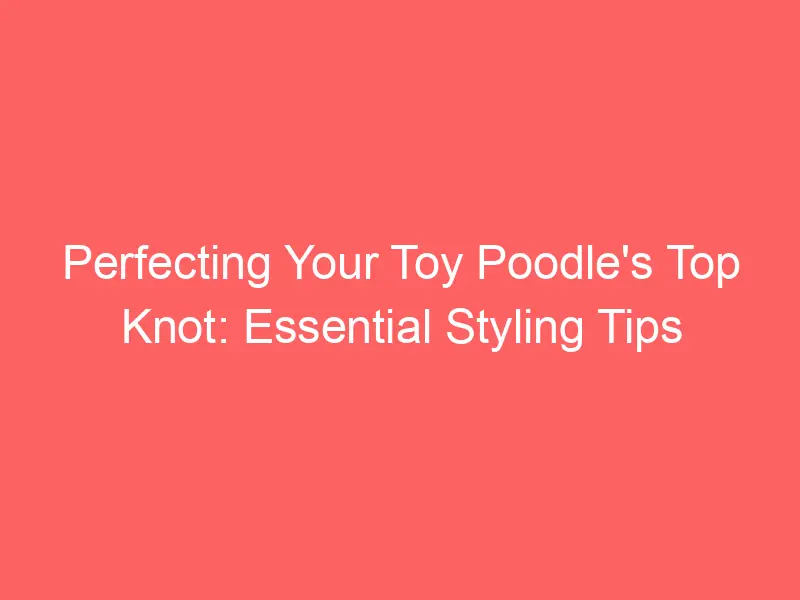Introduction: Toy Poodle Feeding Problems

Feeding problems are a common issue among toy poodles. These small, intelligent, and active dogs have unique dietary needs that, if not met, can lead to health issues. This article aims to shed light on these problems and provide practical solutions to ensure your toy poodle’s health and happiness.
-
- Understanding the issue: Toy poodle not eating
One of the most common feeding problems with toy poodles is their refusal to eat. This can be due to various reasons, including health issues, stress, or simply not liking the food. It’s important to understand that toy poodles are picky eaters and may refuse to eat if they don’t find the food appealing. However, prolonged refusal to eat can lead to malnutrition and other serious health issues. Therefore, it’s crucial to consult with a vet if your toy poodle refuses to eat for more than a day.
-
- Common misconceptions about toy poodle eating habits
There are several misconceptions about toy poodle eating habits that can lead to feeding problems. One common misconception is that toy poodles need less food because of their small size. While it’s true that toy poodles require fewer calories than larger breeds, they still need a balanced diet to meet their nutritional needs. Another misconception is that toy poodles can eat the same food as larger dogs. However, toy poodles have smaller mouths and teeth, which makes it difficult for them to eat large kibble. Therefore, it’s important to provide them with food that is specifically designed for small breeds.
In the following sections, we will delve deeper into understanding toy poodle eating habits, common health problems, food preferences, and feeding solutions. By understanding these aspects, you can ensure your toy poodle’s health and happiness.
Understanding Toy Poodle Eating Habits
When it comes to feeding your toy poodle, understanding their eating habits is essential. This breed has specific dietary needs that, when met, can ensure their health and happiness.
Normal Eating Habits
Toy poodles, like all dogs, thrive on a balanced diet. However, their small size and active nature require a diet that’s slightly different from other breeds.
-
- Typical Toy Poodle Diet
A typical toy poodle diet consists of high-quality dog food, rich in protein to support their energy levels. They also benefit from a moderate amount of healthy fats for a shiny coat and overall health. Carbohydrates should be complex, like sweet potatoes or brown rice, to provide sustained energy.
-
- Toy Poodle Nutrition Needs
Toy poodles need a diet that supports their high energy levels and maintains their lean muscle mass. They require a higher protein content compared to some other breeds, around 20-30% of their diet. They also need a good balance of fats and carbohydrates. Additionally, they benefit from vitamins and minerals found in fruits, vegetables, and certain dog foods. A diet rich in Omega-3 fatty acids can help maintain their shiny coat and healthy skin.
Understanding your toy poodle’s eating habits and nutritional needs can ensure they live a healthy and happy life. Always consult with your vet for personalized advice about your pet’s diet.
Changes in Eating Habits
Just like humans, dogs can also experience changes in their eating habits. This is particularly true for toy poodles, a breed known for their sensitive stomachs and specific dietary needs. Let’s delve into the signs of changes in toy poodle eating habits and the reasons for a poodle’s loss of appetite.
-
- Signs of changes in toy poodle eating habits
Changes in your toy poodle’s eating habits can be subtle or quite noticeable. Some common signs include:
-
-
- Eating less than usual or not eating at all
- Showing less interest in food
- Chewing or swallowing difficulty
- Changes in stool consistency or frequency
- Weight loss or gain
-
It’s important to monitor your toy poodle’s eating habits closely. Any significant changes should be discussed with your vet.
-
- Reasons for poodle loss of appetite
There could be several reasons why your toy poodle is not eating as much as they used to. Here are some common causes:
-
-
- Medical issues: Conditions such as dental problems, infections, or serious illnesses like cancer can affect your poodle’s appetite.
- Stress or anxiety: Changes in environment or routine can cause stress in dogs, leading to loss of appetite.
- Dietary changes: If you’ve recently changed your poodle’s food, they might not like the new taste or texture.
- Ageing: Older dogs often have a decreased appetite due to a slower metabolism and reduced physical activity.
-
If your toy poodle is consistently refusing to eat, it’s crucial to consult with a vet to rule out any serious health issues.
Common Toy Poodle Health Problems
Toy Poodles are known for their intelligence, agility, and affectionate nature. However, like all breeds, they are prone to certain health conditions. In this section, we will discuss some common health problems that can affect a Toy Poodle’s appetite.
Health Issues that Affect Appetite
Several health issues can affect a Toy Poodle’s appetite. Here are the most common ones:
-
- Dental Problems
Dental problems are common in Toy Poodles due to their small mouths. These can include periodontal disease, tooth decay, and gum infections. Such conditions can make it painful for your pet to eat, leading to a decrease in appetite.
-
- Stomach Issues
Stomach issues such as gastritis, ulcers, and gastroenteritis can also affect your Toy Poodle’s appetite. These conditions can cause discomfort and pain, making your pet less interested in food.
-
- Chronic Diseases
Chronic diseases like diabetes, kidney disease, and heart disease can significantly affect your Toy Poodle’s appetite. These conditions often come with symptoms like nausea and decreased energy levels, which can lead to a loss of appetite.
It’s important to note that any change in your Toy Poodle’s eating habits should be taken seriously. If you notice your pet is eating less or refusing food, it’s best to consult with a veterinarian immediately. Early detection and treatment can significantly improve your pet’s health and quality of life.
How Health Problems Cause Food Refusal
It’s not uncommon for toy poodles to refuse food due to health problems. Understanding the link between these issues and food refusal can help you address the problem effectively.
-
- Link between health problems and toy poodle food refusal
Health problems can significantly affect a toy poodle’s appetite. For instance, dental problems can make chewing painful, leading to food refusal. Similarly, stomach issues can cause discomfort during or after eating, resulting in the dog avoiding food. Chronic diseases can also affect a dog’s appetite, either directly or due to the side effects of medication.
-
- Case study: Toy poodle with dental issues refusing to eat
Consider the case of Max, a 7-year-old toy poodle. Max started refusing his food, which was unusual for him. Upon examination, the vet discovered that Max had severe dental issues, including gum disease and a couple of loose teeth. These dental problems were causing Max pain whenever he tried to eat. After receiving appropriate dental care, Max’s appetite improved, and he started eating regularly again. This case highlights the importance of regular health checks for your toy poodle to prevent and address such issues promptly.
As a toy poodle owner, it’s crucial to monitor your pet’s eating habits closely. Any changes in appetite or food refusal should be taken seriously, as they could be signs of underlying health problems. Regular vet check-ups can help identify and treat these issues early, ensuring your toy poodle’s health and happiness.
Poodle Food Preferences
Understanding the food preferences of your toy poodle is crucial for their health and happiness. This section will delve into the fascinating world of poodle taste buds and how they influence food choices.
Understanding Poodle Taste Buds
Just like humans, poodles have taste buds that help them distinguish between different flavors. However, their taste buds are not as sensitive as ours, which can influence their food preferences.
- How taste buds affect toy poodle food preferences: Poodles, like other dogs, have fewer taste buds than humans. This means they rely more on their sense of smell to determine what is edible and what is not. However, they do have a preference for certain flavors, such as meaty or savory foods. This is why many poodle owners notice their pets showing a preference for foods with a strong smell or taste.
- Why some foods are more appealing than others: Poodles are naturally drawn to foods that are high in protein and fat. This is because their ancestors were carnivores and these preferences are still ingrained in their DNA. Foods that are high in these nutrients tend to be more appealing to poodles. However, it’s important to balance their diet with fruits, vegetables, and grains to ensure they get all the necessary nutrients.
Understanding your poodle’s taste buds and food preferences can help you make better feeding decisions. Remember, a healthy diet is key to a happy and healthy poodle.
How to Cater to Your Poodle’s Preferences
Knowing your poodle’s food preferences is crucial for their health and happiness. Here are some steps to help you cater to your poodle’s preferences:
-
- Choosing the right food
Choosing the right food for your poodle is the first step in catering to their preferences. Poodles are known for their discerning taste buds, so it’s important to select high-quality, nutritious food that they’ll enjoy. Consider factors like the food’s nutritional content, flavor, and texture. For instance, poodles often prefer foods with a meaty flavor and a soft texture. Also, consult your vet to ensure the food meets your poodle’s dietary needs.
-
- Introducing new foods
Introducing new foods to your poodle can be a delicate process. Start by mixing a small amount of the new food with their current food. Gradually increase the proportion of the new food over a week or two. This slow introduction helps your poodle adjust to the new taste and reduces the risk of digestive upset. Remember, patience is key when introducing new foods to your poodle.
By understanding and catering to your poodle’s food preferences, you can ensure they’re getting the nutrition they need while also enjoying their meals. Always consult with your vet before making significant changes to your poodle’s diet.
Poodle Feeding Solutions
Feeding your toy poodle can sometimes be a challenging task. However, with the right approach, you can ensure your pet is eating healthily and happily. Let’s delve into some solutions to common toy poodle diet issues.
Addressing Toy Poodle Diet Issues
Toy poodles may occasionally exhibit certain diet issues, such as refusing to eat or developing unhealthy eating habits. Here are some steps you can take to address these issues:
-
- Steps to take when your toy poodle refuses to eat: If your toy poodle is refusing to eat, it’s important to first rule out any potential health issues. If your pet appears healthy otherwise, try changing up their diet. Introduce new, nutritious foods gradually and ensure they are appropriate for your toy poodle’s size and age. Remember, patience is key. It may take some time for your pet to adjust to the new diet.
- How to encourage healthy eating habits: Encouraging healthy eating habits in your toy poodle is crucial for their overall health and well-being. Start by establishing a regular feeding schedule. This helps your pet understand when it’s time to eat. Make sure you’re providing a balanced diet, rich in proteins, vitamins, and minerals. Avoid feeding your pet human food, as it can lead to obesity and other health issues. Lastly, make meal times fun and engaging by using interactive feeding toys. This not only stimulates your pet’s mind but also slows down their eating, reducing the risk of digestive problems.
Remember, every dog is unique and what works for one might not work for another. It’s important to monitor your pet’s eating habits and adjust their diet as needed. If you’re ever in doubt, don’t hesitate to consult with a professional veterinarian.
When to Seek Veterinary Help
It’s crucial to know when your toy poodle’s diet issues are serious enough to warrant a visit to the vet. Here are some key things to look out for and what to expect when you take your furry friend to the vet.
-
- Recognizing serious toy poodle diet issues
Toy poodles are prone to certain diet-related health problems. If your toy poodle has sudden changes in appetite, unexplained weight loss, or gastrointestinal issues such as vomiting or diarrhea, it’s time to seek veterinary help. Other serious signs include lethargy, excessive thirst, and changes in behavior. Remember, early detection of problems can lead to more effective treatment.
-
- What to expect at the vet
When you take your toy poodle to the vet, they will likely perform a physical examination and may request certain tests to diagnose the problem. This could include blood tests, stool analysis, or imaging studies. The vet will then discuss the results with you and propose a treatment plan. This could involve dietary changes, medication, or in some cases, surgery. Always ask questions if you’re unsure about any part of the process. Your vet is there to help both you and your pet.
In conclusion, it’s important to monitor your toy poodle’s eating habits and seek veterinary help when necessary. Your vet is your best resource for ensuring your toy poodle’s health and happiness.
Conclusion: Ensuring Your Toy Poodle’s Health and Happiness
As we wrap up our discussion on toy poodles, their feeding habits, and common health problems, it’s clear that their diet plays a significant role in their overall health and happiness. Here are some key takeaways and final thoughts to help you maintain your toy poodle’s diet effectively.
-
- Key takeaways about toy poodle feeding problems
Toy poodles can be picky eaters, and their small size makes them prone to certain health issues like hypoglycemia. It’s important to provide them with a balanced diet that includes high-quality proteins, carbohydrates, and fats. Avoid feeding them table scraps and foods that are toxic to dogs, such as chocolate and grapes. Regular vet check-ups can help detect any feeding problems early.
-
- Final thoughts on maintaining your toy poodle’s diet
Maintaining your toy poodle’s diet requires consistency and vigilance. Monitor your poodle’s eating habits and adjust their diet as needed based on their age, weight, and health status. Remember, a healthy diet contributes to a longer, happier life for your toy poodle. For more detailed information, consult with your vet or a pet nutrition expert.
In conclusion, your toy poodle’s health and happiness largely depend on the care and attention you provide, especially when it comes to their diet. By understanding their unique needs and feeding them appropriately, you can ensure they live a long, healthy, and happy life.
